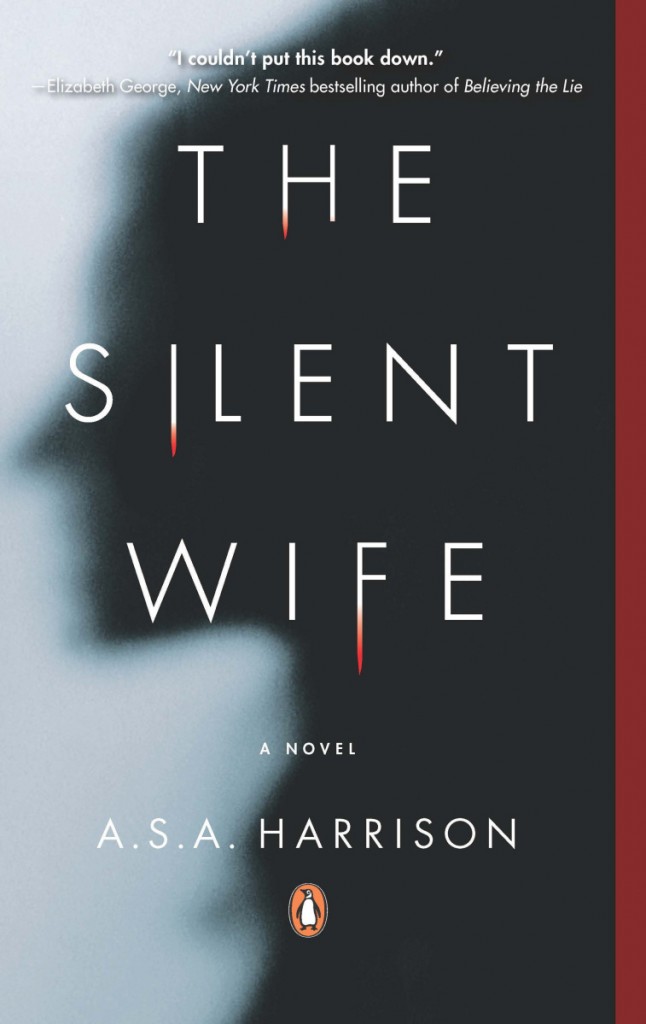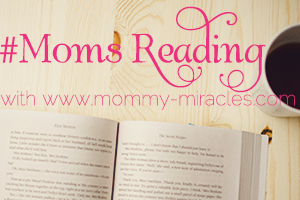“A few short months are all it will take to make a killer out of her.” (Chapter 1)
I picked up The Silent Wife by A.S.A. Harrison because it was suggested that I would like this book if I liked Gone Girl. A few paragraphs into the first chapter was all I needed to realize that this novel, like Gone Girl, is a psychological thriller. The Silent Wife chronicles the lives of Jodi and Todd Brett, a couple who keep appearances up on the outside but allow a bad marriage to rot on the inside. “The Silent Wife is a finely wrought, emotionally charged psychological thriller about a marriage in the throes of dissolution, a couple headed for catastrophe, concessions that can’t be made, and promises that won’t be kept.” (from the publisher).

This novel is one that I almost don’t know how to review because there are so many angles I could approach it from. Harrison writes a novel that is rife with suspense, poignant themes, and psychological drama. The story jumps between Jodi and Todd’s perspectives in a way that invites the reader to psychologically analyse these characters. Harrison keeps the reader guessing and filling in the blanks until the very last pages, and even the conclusion leaves some question in the reader’s mind. A.S.A Harrison got me thinking about the characters and the story and now that I have closed the book, I am still thinking about it.
How much control do we have over the direction our life takes? This is a central question in The Silent Wife. Both Jodi and Todd sit back and accept the life happening around them without accepting responsibility for their ability to direct it. Jodi, a psychologist, believes that life follows the same path that was laid out by your parents before you: “Whoever you are and wherever you come from, you grew into your present shape and form in the garden of your early childhood. In other words, your orientation to life and the world around you – your psychogenic framework – was already in place before you were old enough to leave the house without parental supervision.” (Chapter Seven). How can she blame Todd for his infidelity when his father chose a bottle over his wife? How can she be expected to create change in her relationship when her parents have maintained a perfect ruse of a marriage without even speaking to each other? How can either of them be expected to take any responsibility for their own roles in their respective lives and their collective relationship if their lives just follow a familial pattern?
Jodi buries herself in the lives of others to avoid the realities of her own. “She changes into sweatpants, draws the drapes in the bedroom, and burrows into the unmade bed, taking up her novel, a story of three generations of women whose hardships include brutal husbands, ungrateful children, and the social and cultural deprivations of a small rural community. The story of their dreadful lives distracts her for a while, but when she’s read to the end and closed the book, the return to reality is harsh.” (Chapter Three). She busies herself with her clients, listening to their hardships to minimize her own personal chaos. She gives advice so she doesn’t have to listen to her own.
Meanwhile, Todd is completely content to let circumstances spiral out of control. He refuses to accept responsibility for his infidelity, or any of the following events that the infidelity leads to. He ignores opportunities to communicate and completely avoids making decisions. “At no point did he actually come to a decision, and even now he can’t say that his mind is made up.” (Chapter Ten). Doing this protects him from the consequences of his own actions. It allows him to deeply hurt other people (including his wife and a good friend) without feeling the resulting pain. Despite his precautions, his willful ignorance and lack of self awareness leaves him incredibly depressed. “At one time, not so long ago, he naively believed that Natasha could banish his anxiety forever, as if their love were a form of enchantment that could keep him always safe.” (Chapter Twenty Four)
“He doesn’t know who is in charge of his life these days but it sure as hell isn’t him.” (Chapter Twenty Two)
The Secret Wife is full of characters living in silence. Jodi’s silence is manifested through her denial. She had a “terrific ability to shut out what she didn’t want to see, forget what she didn’t want to know, put a thing out of her mind and never think about it again. In short, to live her life as if certain events had never come to pass.” (Final Chapter). Todd chooses to remain silent when there is a need to make hard decisions. Todd’s father silenced himself with alcohol, which paradoxically led to violent outbursts. Jodi’s parents chose silence to preserve a failing marriage while the children of this marriage keep the past silent for their own self preservation.
I’m unsure if anyone found their voice in the end. I am left believing that the choice Jodi made to unsilence herself actually led to the greatest silencing in the book, for both her and her husband.
“How is it that her life has arrived at this implausible culminating moment when she’s done her best for so many years to make things work to be helpful and accommodating, a good wife and companion, often in adverse and trying circumstances? Todd is not an easy man to live with, and yet she’s made a success of it, held things together, created and maintained a peaceful, agreeable life for the two of them.” (Chapter Nine).
The Silent Wife leaves a reader wondering whether life is malleable or whether destiny is static. Can patterns ever be broken? If they can’t be, are we left to just accept the outcomes without doing anything about it? Harrison seems to want her reader to stop the silence and be responsible for the life you are leading, even when you can’t be responsible for the direction of anyone else’s life.
The Silent Wife really picked up speed at the end and I could not put it down, but it did start off slow for me. I suppose the big question is, “How does it compare to Gone Girl?” For me, The Silent Wife was entirely different, but in a good way. I was not re-reading a story I had already read. The Silent Wife was a lot more psychological and perhaps this even leads to a higher amount of suspense and questioning from the part of the reader. Sure, if someone liked Gone Girl, they would likely also like The Silent Wife, assuming they weren’t expecting more of the same, but I would also imagine that readers who did not like Gone Girl would find a lot of differences in The Silent Wife. Because I could not put this novel down during the second half of the book, and because I still can’t stop thinking about it, I will give The Silent Wife a solid 4 stars, meaning that I really liked it!

 Moms Reading (or, #MomsReading) is a book club designed for busy Moms in mind. It is an online book club that meets once a month on Facebook to discuss that month’s book. If you would like to join us in October, we are reading Me Before You by Jojo Moyes and we will be chatting about it Wednesday, October 30th at 9pm Eastern. Check out the MomsReading page, Like us on Facebook, or join the Goodreads group to keep up to date with our book choices and the book chats.
Moms Reading (or, #MomsReading) is a book club designed for busy Moms in mind. It is an online book club that meets once a month on Facebook to discuss that month’s book. If you would like to join us in October, we are reading Me Before You by Jojo Moyes and we will be chatting about it Wednesday, October 30th at 9pm Eastern. Check out the MomsReading page, Like us on Facebook, or join the Goodreads group to keep up to date with our book choices and the book chats.









I only skimmed this, because I still plan to read the rest of it!
Greta @gfunkified recently posted..Project 365 (Week 40)
Pinned! I love good books. I wish there was more time for me to read them.
Jennifer recently posted..My Dolphin Show App Review
Gone Girl is on my reading list, and now this one is, too. :)
Andrea recently posted..Little Black Cat
I’m definitely reading this!